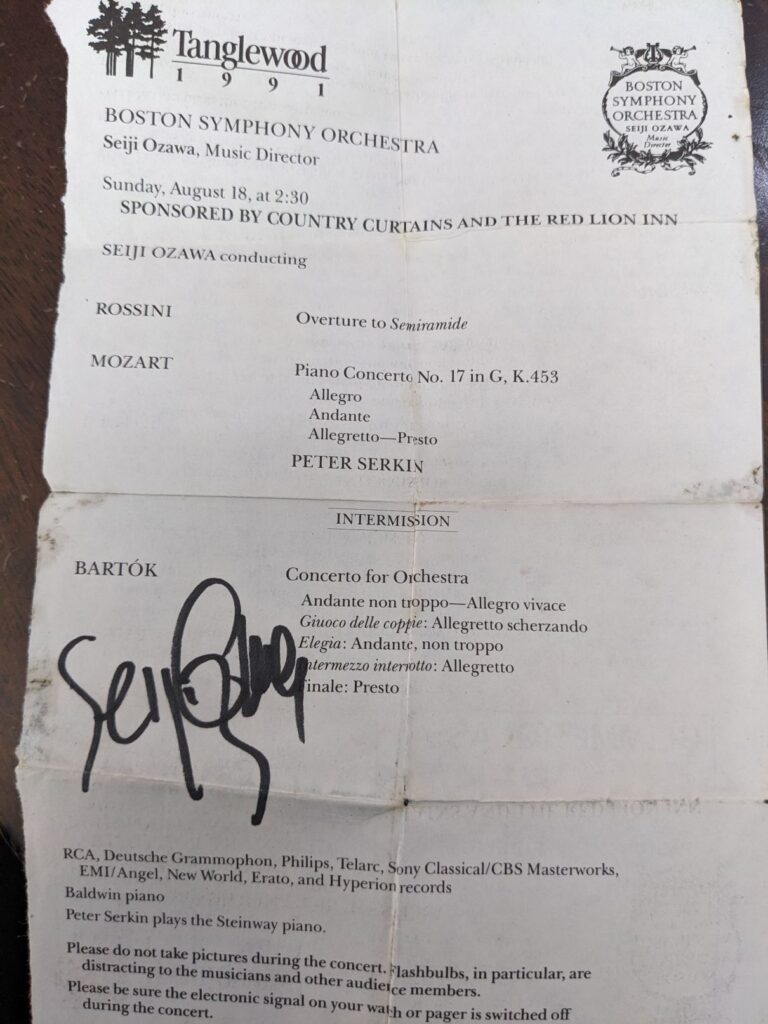In my wallet is a page from a Boston Symphony’s program from 33 years ago. It’s a memento from a family trip to Tanglewood Music Festival, six month before my family went back to Japan, leaving me behind to continue my studies at Juilliard.

Maestro Seiji Ozawa, who signed the program for me that day in 1991, passed on last week, on February 6th.
He left Kobe Japan in February of 1959, spending 53 days on a cargo ship to get to France. In September of that same year, he was to win the first prize at the 1959 International Competition of Orchestra Conductors in Besançon, France. He was then invited to Tanglewood Music Center, where he won the Koussevitzky Prize for outstanding student conductor, winning the scholarship to study with Karajan. The rest was history. In short, he changed the course of the history in so many ways, especially for Asian musicians like myself.
A symphony orchestra is sometimes compared to the military, and conductors to the commanders. Just as commanders assessing the military strategy from afar in safety, conductor stands on a podium without an instrument, remaining silent throughout. The orchestra players, like the soldiers in the battle field, follow their conductors/commanders only when they feel the utmost respect and absolute trust to the one in charge. Ozawa, still in his mid-twenties and from Japan, won that respect and trust from older white male players in some of the world’s most highly regarded orchestras. That is a feat that cannot be overstated. It’s probably unimaginable for us today when DEI is in such forefront. Seiji’s accomplishment was not only a testament to his own charisma, musicality and technique, but to the power of music.
We must also appreciate how Japan post-WWII was fertile enough to produce musicians, not only Seiji Ozawa, but also pianist Hiroko Nakamura, cellist Tsuyoshi Tsusumi, my teacher in NY Miyoko Nakaya-Lotto, and many others who went onto perform and teach all over the world in the 60s and onward. For example, Ozawa’s family, in the aftermath of the war, spent three days on foot to bring home a cheap second-hand piano on a hand-drawn cart for their talented young Seiji. And then there were the older Japanese musicians who believed in the power of music education to heal and restore their devastated country. Seiji’s piano teacher, Noboru Toyomasu, became the first Japanese pianist to perform on Berliner Philharmoniker’s subscription concert in 1956. And there was the conductor, Hideo Saito, who taught Seiji the art of conducting. After Seiji’s unsuccessful attempt to secure the French government’s scholarship, people around Seiji raised money to send him off to Europe. These were some of the PTA members of Seiji’s music school, as well as businessmen like Fuji Television Network’s first president, Shigeo Mizuno, and the president of Subaru Corporation, Eiichi Ohara. Their generosity is a reflection of their optimism and faith in the power of music and the future of globalization.
And on the receiving end in Europe and the States, people collectively chose to focus on Seiji Ozawa’s musicality rather than the color of his skin, and the history of international conflicts. And it is by extension of these good wills that I am where I am today as a Japanese musician in the U.S. 18 summers after Seiji Ozawa signed my concert program, I performed in the Ozawa hall, not only once or twice, but multiple times, as a fellow at the Tanglewood Music Center.
Music lives on. Let the power of music heal us all.
Pingback: 美笑日記2.13:音楽のバトンリレー(小澤征爾さんを偲んで) - "Dr. Pianist" 平田真希子 DMA
Oh, what a wonderful memory and story–one for a lifetime. This brings tears to my eyes with so much appreciation for all that you share here with the world. He was a very important person in the world of music and sometimes, I think, under appreciated. But when we watch his performances over the years, we must return to them a second time to truly see and hear how he conducts with such grace, such dignity, and such an elevated spirit and sense of the music. Thank you so much again for sharing this and for your beautifully written homage to a truly great man.
Thank you, Pamela, for your kind words and joining me in celebrating Seiji Ozawa!
Makiko